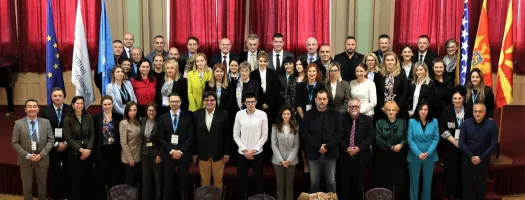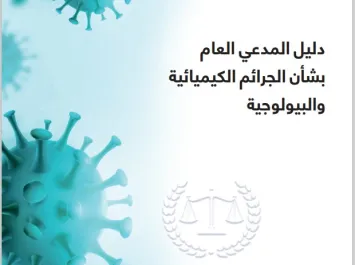In a concerted effort to bolster regional resilience against chemical, biological, radiological, and nuclear (CBRN) risks and threats, legal experts, prosecutors, judges, investigators, policymakers, and international stakeholders convened for a two-day CBRN Criminalisation Workshop tailored to the Western Balkans. The event brought together 40 representatives from Bosnia and Herzegovina, Montenegro, and North Macedonia to explore legislative strategies, international obligations, and practical tools for criminalising CBRN-related offences.
The CBRN Criminalisation Workshop was held at the Army Hall in Sarajevo from 6 to 7 November 2025 and was conducted by UNICRI in close collaboration with Mr. Samir Huseinbasic, the CBRN National Focal Point of Bosnia and Herzegovina. The event was fully funded by the European Commission’s Service for Foreign Policy Instruments, under the framework of the European Union (EU) CBRN Risk Mitigation Centres of Excellence (CoE) Initiative.
One-Stop-Shop in CBRN Criminalisation
Criminalising CBRN-related offences typically requires engagement with multiple international organisations across different global hubs. For chemical crimes, states turn to the Organisation for the Prohibition of Chemical Weapons (OPCW) in The Hague. Addressing biological crimes involves coordination with the Implementation Support Unit (ISU) of the Biological Weapons Convention in Geneva and the United Nations Office for Disarmament Affairs (UNODA) in New York. Criminalisation of radiological and nuclear crimes falls under the mandate of the International Atomic Energy Agency (IAEA) and the United Nations Office on Drugs and Crime (UNODC), both based in Vienna. The workshop also involved the United Nations Office of Counter-Terrorism (UNOCT) based in New York, addressing CBRN terrorism-related threats.
This workshop uniquely convened all these key international actors in one location, providing beneficiary countries with a rare opportunity to receive integrated training and guidance on the full spectrum of CBRN criminalisation.
Foundations of CBRN Criminalisation
The workshop opened with an overview of its objectives: to enhance national legal frameworks, align them with international conventions, and foster regional cooperation. A general presentation on criminalisation laid the groundwork, emphasizing the importance of clear, enforceable laws to deter and prosecute CBRN crimes.
Participants examined global CBRN legislation, identifying best practices and gaps in implementation. A dedicated session on human rights considerations underscored the need to balance security imperatives with civil liberties, especially in emergency response and investigative procedures.
Biological and Chemical Security in Focus
The Biological Weapons Convention (BWC) was spotlighted as a cornerstone of international efforts to criminalise biological crimes. Experts discussed how its provisions can be translated into domestic law, with emphasis on dual-use technologies and pathogen control.
Bosnia and Herzegovina, Montenegro, and North Macedonia presented their national approaches to chemical and biological security legislation, highlighting progress and challenges in harmonising them with international standards.
The “World Café” session fostered dynamic dialogue on legislative advocacy avenues, enabling participants to share strategies for engaging lawmakers, civil society, and international partners.
Chemical, Radiological and Nuclear Threats
The Chemical Weapons Convention (CWC) was explored in depth, with a focus on criminalising chemical crimes and ensuring compliance through national legislation. VERTIC (Verification Research, Training and Information Centre) provided insights into supporting states with the implementation of criminal-related CBRN obligations.
The first day concluded with a comparative analysis of radiological and nuclear security legislation across the Western Balkans, revealing varied levels of preparedness and the need for harmonised legal responses.
International Legal Instruments and Practical Implementation
Day two shifted focus to the international legal framework against CBRN terrorism. Participants delved into the International Convention for the Suppression of Acts of Nuclear Terrorism (ICSANT), examining its key provisions and synergies with other instruments such as the Convention on the Physical Protection of Nuclear Material (CPPNM) and its Amendment.
A key session of the workshop focused on the international legal framework for nuclear security and the criminalisation of radiological and nuclear crimes, offering participants a comprehensive overview of relevant legal instruments and model legislative provisions. The session highlighted the role of the International Atomic Energy Agency (IAEA) in supporting states with the adherence to and implementation of the Convention on the Physical Protection of Nuclear Material (CPPNM) and its Amendment, emphasizing the importance of aligning national laws with international obligations. . To bridge theory and practice, participants took part in interactive, scenario-based discussions simulating real-world challenges in investigating and prosecuting nuclear security offences. These exercises encouraged critical thinking, interagency collaboration, and a deeper understanding of how legal tools can be effectively applied to radiological and nuclear threats.
A legal deep dive into ICSANT offences clarified the requirements of general and special intent, essential for effective prosecution. Legislative assistance tools — including the joint IAEA-UNODC model criminal provisions, UNODC’s fictional case manual, and its repository of criminalisation provisions — were showcased as practical resources for lawmakers and prosecutors.
Putting Theory into Practice
Sessions on combating radiological and nuclear terrorism emphasized operationalising ICSANT through national law and inter-agency coordination. The role of the United Nations Secretary-General’s Mechanism (UNSGM) for investigating alleged use of chemical and biological weapons was also discussed, reinforcing the importance of international cooperation in verification and accountability.
The United Nations Office of Counter-Terrorism (UNOCT) delivered a dedicated presentation on combating radiological and nuclear terrorism, illustrating how the International Convention for the Suppression of Acts of Nuclear Terrorism (ICSANT) can be effectively put into practice. To reinforce theoretical knowledge with practical application, participants engaged in interactive scenario-based discussions, simulating real-world challenges in investigating and prosecuting nuclear security offences. These exercises fostered critical thinking, interagency collaboration, and a deeper understanding of how legal tools can be deployed in response to radiological and nuclear threats.
The workshop concluded with a forward-looking discussion on regional needs, legislative gaps, and priorities for future training. Participants expressed strong interest in continued collaboration, technical assistance, and capacity-building to ensure robust legal frameworks that can effectively address evolving CBRN threats.



